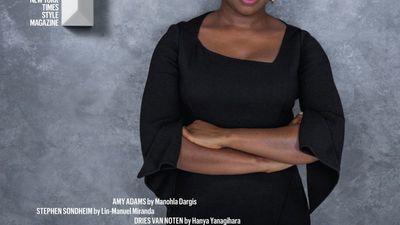Chimamanda Ngozi Adichie's New York Times Style Cover Story Is Full of Gems
New York Times names Chimamanda Ngozi Adichie as one of "The Greats."
October 18, 2017
Chimamanda Ngozi Adichie is one of seven people to grace the over of New York Times Style Magazine's "The Greats Issue."
The celebrated novelist is recognized as being a masters in her field, alongside artists like Nicki Minaj, Amy Adams and director Park Chan-Wook.
In her profile, entitled "Chimamanda Ngozi Adichie, a Humanist On and Off the Page," fellow novelist Dave Eggers sits down with the writer for an intimate conversation about her life and career.
Below are some highlights from the story.
Adichie Calls Out a High School Student's Casual Sexism:
The students had been assigned to read Adichie's essay based on the talk, and thus it was dispiriting when the first question came from a young man, originally from Ghana, who very politely asked how Adichie was balancing her work with the responsibilities of motherhood.
She looked down and smiled. She took her time, and then, with her chin still lowered, she raised her eyes to look kindly at the student.
"I'm going to answer your question," she said, "but you have to promise me that the next time you meet a new father, you ask him how he's balancing his work and the responsibilities of fatherhood."
On her parent's reaction to her pursuing writing instead of medicine:
When I said I wanted to write, they were very supportive, which was very unusual," she said. "Nobody just leaves medical school, especially given it's fiercely competitive to get in. But I had a sister who was a doctor, another who was a pharmacist, a brother who was an engineer. So my parents already had sensible children who would be able to make an actual living, and I think they felt comfortable sacrificing their one strange child.
On feeling free from artistic constraints when writing Americanah:
I decided with that book that I was going to have fun, and if nobody read it, that would be fine," she said. I was free of the burden of research necessary for the other books. I was no longer the dutiful daughter of literature.
